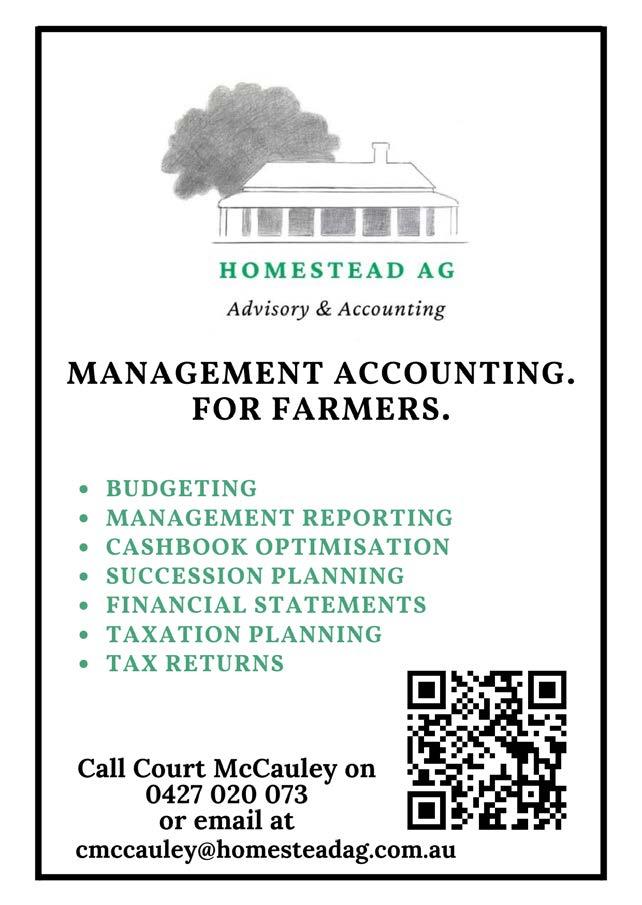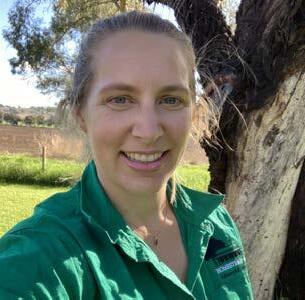
6 minute read
BUSINESS MANAGEMENT FARM MANAGEMENT PLANNING – WRITE IT DOWN
By Court McCauley –Homestead Ag Advisory & Accounting
Making a business plan might sound like something you would do when starting a new business. This business plan might be the portfolio you take to banks and investors when looking for your startup funding. But the truth of it is, every business needs ongoing planning. Given the host of variables farmers face, good planning becomes even more crucial.
Advertisement
Honestly, ‘planning’ can be such a broad term and include things like workflow planning, risk management planning, financial planning and more. The list goes on! To keep things on track, I’m going to focus on the types of planning I deal with day to day as a farm management accountant that can have a huge impact on your farm business. Farm management planning can include everything from your daily or weekly tasks and to-do lists, to your annual budgets, your 5-year goals, and all the way to your longterm succession or retirement plans.
What could we be doing?
Different people will tell you to prioritise these forms of planning differently. I believe you can work through them in the order that is right for you. If you need your daily task list squared away before you can even begin to think about your overall business goals, then do that first!
When I’m speaking with clients and helping them through their initial management planning, this is the process I like to follow:
1. STRATEGIC PLANNING (MEDIUM TO LONG TERM)
Where do you want your farming business to be in the next five to ten years? What goals do you want to achieve?
Setting these goals gives you the target you’re aiming for, which makes it much easier to determine how you’re going to get there. Your goals can be anything! To buy another farm, to move from working on and off farm to being solely supported by the farming business, to drought (or flood) proof your farm, invest in various property improvements, to grow an award winning wheat crop, develop your livestock to meet specific benchmarks, market your products to local consumers, add in a contracting business – the sky's the limit! Pick what you’re passionate about and write it down.
2. BUDGETING – THE ROAD MAP (SHORT TO MEDIUM TERM)
Every business needs a budget. They are an essential tool for owners and managers. Budgets set out what you plan to achieve in your business and lay out your road map for getting there. Doing them in your head does not count – you must write it down!
Once you have a written budget you can review the impact of your plan on your cash flow, and deal with any funding gaps early, determine if your plan is viable, trial different scenarios, make any tweaks or improvements and share your plan with your team. The biggest value from your budget comes later, when you compare what happened with your budgeted figures. You get to find out where you were right, where you were wrong, and, more importantly, why? Did something change, or were your assumptions wrong? You get to learn how to improve both your budgeting and what you’re doing on farm. You get a deeper understanding of how your farm business works. When you’re comparing your actuals to your budget, and figuring out the reason behind the variances, write it down. Write down the what and the why. It holds you accountable and can be invaluable when you’re looking at what has happened in order to make a decision to move forward.
3. TASK LISTS (SHORT TERM)
Tasks lists are one of the most basic things that you can do to keep yourself and your team on track. I like to use the planning that I’ve done in preparing my budget as the basis for my task list – is sowing coming up? Then I need to make sure all the machinery is in working order, seed, fertiliser, fuel and chemicals are ordered or in the shed.
It’s easy to get overwhelmed by everything we must do, which can lead to nothing getting done or the wrong things being prioritised. One of the best things a previous director of mine used to do was get us to write down our task lists, then when we went through them together he would give us our top 1-5 priorities. By having us write out our own task lists we were taking responsibility for our jobs, then allowing the boss with the oversight of the whole operation to determine which were most important at any one time.
It is much easier to prioritise a list of jobs than to try to think of everything that may need to be done.
Of course, tasks and priorities can change without warning, especially in farming. Having a task list doesn’t mean that you can’t deviate from it.
4. TAX PLANNING –ANNUAL AND LOOKING AHEAD
Tax planning won’t be required in every business every year. In the third year of a drought with large carried forward tax losses, I wouldn’t recommend it! However, when the outlook is good, you’re selling livestock, harvesting decent crops, contracting round the clock, or punching out hay bales, a little bit of tax planning can make a big difference.
If you’re not quite sure where you sit, it’s a good idea to check in and see. It doesn’t have to be a full-blown tax plan, but a review of your position and a chat with your accountant can ease your mind or show the need for a more detailed plan.
The bigger the decision that you’re looking to make, the further out you need to start your tax planning. For selling trading stock (grain, hay, livestock, etc.), pre-30 June tax planning is generally sufficient. If you’re looking at selling a property, you might need to start planning for that 5 years out or more.
5. SUCCESSION PLANNING (LONG TERM)
Succession planning is still underutilised in farming businesses. It’s a tricky area, full of tax and legal implications and can be highly emotionally charged.
The four best bits of advice I’ve come across in relation to succession planning are: i. it’s never too early to start ii. keep communication open, honest, and respectful iii. engage the experts iv. the succession plan is never ‘done’.
Every member of every family will have different wants, needs and expectations, which can be very difficult to manage. And it’s unlikely that everyone will be happy with all of the outcomes.
Yet, just because something is difficult, doesn’t mean it’s not worth doing. Starting succession planning in your farming business can allow for the older generation to plan for a well-supported life after farming, while the younger generation have something to base their longer term on or off farm plans around. It can remove unmet expectations and, in some cases, help to prevent costly litigation and bitter disputes between family members upon the death of a loved one.
How can we start?
Start by looking at what you’re already doing and build from there. You don’t need to throw everything out and start from scratch, and it doesn’t have to be perfect to start with. Are you already preparing an annual budget for the bank? If so, think about how you can start to turn that into a management tool in your farm business.
You’re already running your farm business, so you’re already carrying out daily and weekly tasks. Can you streamline these? Utilise an app, set repeating tasks, delegate, prioritise and make it clear who has what responsibility. For strategic planning, I’m betting you already have an idea of what you’re trying to achieve. Start by writing it down. Define your vision for your farm and set some goals to measure your success.
If you’re not already doing regular tax planning and developing the succession plan for your farming business, start the conversation with your accountant and solicitor, and start to get some plans and advice in writing.
The key takeaways:
When it comes to your farm management planning, my top three tips and take aways are:
1. START WHERE YOU ARE.
It’s never too early to start planning, and you can make the most difference the sooner you start. There’s no such thing as being in the ‘right’ place to start planning.
2. CONTINUOUSLY REVIEW AND IMPROVE.
As Brian Tracy said ‘Practice the philosophy of continuous improvement. Get a little bit better every single day.’
3. GET EXPERT ADVICE.
Engaging experts to provide you with good advice can save you a lot of time, money, and frustration in the long run.
Court McCauley –Homestead AG Advisory & Accounting
Court was raised on a beef cattle and cropping farm near Cowra on the Lachlan River. Her love of agriculture started from a very young age, always out helping her dad on the farm. Even when things weren’t going to plan the process of problem solving, learning, collaborating, failing, pivoting, and, eventually, winning was exciting and still drives Court.
After studying at UNE in Armidale, Court worked as an accountant in Dubbo for nearly 10 years, working nearly exclusively with farming clients whilst qualifying to become a chartered accountant. She was able to learn from clients about their farms and farming practices and see what information the top tier of farmers wanted to know before making decisions.

After a further couple of years working with farming clients in Moree, Court and her husband Brett knew it was time to move their young family back closer to home. Currently living on a property near Canowindra and raising three very strong-willed children, Court has opened her own firm, Homestead Ag, specialising in advisory and accounting for farmers.
Court now gets to use her agricultural background and accounting expertise to bring management accounting to farmers, to strengthen and grow farming businesses.









